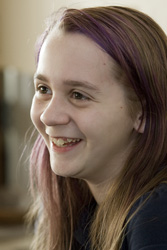
|
||||||||
| Analysis: Singer Teaches Us How to Love Our Neighbor | |||||||||||
|
NASHVILLE Al Hampton, 62, was so moved by Susan Boyle that he played the YouTube video of the unassuming 47-year-old singer's triumphant television performance four times back to back. "I like to cry," he says. Katy Kaufman, 14, felt good inside hearing the beauty of Boyle's voice transform an audience prepared to judge the singer based only on her plain appearance. "It was like wow," Katy says. "It was so beautiful. It was really beautiful." Conversations like these across the fellowship dinner tables at Calvary United Methodist Church have been taking place all over the world since Boyle's audition on "Britain's Got Talent." Tens of millions of people have seen the clip, in which an unaffected woman who had been bullied much of her life comes on stage to eye rolling and open derision and ends up receiving several standing ovations for a stirring rendition of "I Dreamed a Dream" from the musical "Les Miserables." The number of Web hits keeps growing as viewers feel called to share the life-affirming experience with their friends. Susan Boyle showed us the folly of judging others based on age and appearance, many people agree. Now, the critical question is what will be the lasting impact of this lesson. If we write this off as being only the story of a one-in-a-million underdog the equivalent of a poor person finding financial freedom by winning the lottery while others are lured deeper into debt by state-sponsored gambling then we will have tossed away a modern-day sign and wonder. To pass Boyle through a gate of public acceptance while leaving behind the millions of people like her without such an unusual gift would reinforce the cruelty and insensitivity with which many of us initially approached the villager with frizzy, graying hair and a simple housedress. But if we can take this moment of grace this warm feeling that reached into our hearts and souls and gave us hope in a common humanity beyond superficial stereotypes and embrace the Susan Boyles that we may have marginalized in our lives, then we can change the world. It will not be easy, some at Calvary say. Missing what's on the inside' Hampton says he sure pegged Boyle wrong on first appearance, and the initial reaction of many "really demonstrates the humanness in us." Meredith McAdory, 13, says the fact Boyle was such a good singer made a big difference in how people accepted her. Not everyone has the same gift. "In school, people can see you on the outside, or hear things about you, but they don't see you on the inside," she says. In a rehearsal break, members of the sanctuary choir at Calvary discuss Boyle. Young and old, people as varied in physical appearance as any you would meet on the street, they say Susan Boyle would be accepted as she is in their church and in their choir. Some are upset that her appearance has gained so much attention relative to her talent. Others see evidence of something greater, even a divine plan, in how this phenomenon is touching hearts throughout the globe. The number of Web hits alone is surpassing 100 million. Howard McAdory, co-director of the Calvary praise team, admits he did not expect much when he first saw Boyle, only to be bathed in wonder when she began to sing. He compares Boyle to Mary, the mother of Jesus, as a person God used in ways people may not understand or expect. A moral lesson What if this unemployed charity volunteer from a Scottish village of 5,000, a faithful churchgoer who never gave up hope, can help teach us to love our neighbor as ourselves? "Where I saw God was in the people's reaction to her, including the judges," says choir member Mark Medford, 63. Her voice may not only inspire people to think about God, but to think about how they relate to people who are plain or poor or downtrodden, Medford says. "We are all people of God. We are all God's creatures. I think there's a moral lesson of what we should expect from our fellow man." This, finally, is Boyle's gift. Her voice awakens us to the transcendent qualities in human beings. In a culture where idols are made of the thin and rich, young and beautiful, she guides us to an understanding that all people are children of God possessing inestimable value and dignity. There is already talk about changing Susan Boyle, giving her a fashion and a physical makeover so she can more resemble the type of manufactured celebrity that is our typical pop culture obsession. But Susan Boyle is not the person we need to change. On a national television stage, she kept her composure and her sense of self in the face of ridicule. Boyle is right when she said in an interview later, "I wouldn't like to change anything. I'm perfect the way I am." The person we have to change is ourself. |
|
||||||||||
 |
Last
Updated
April 25, 2009






